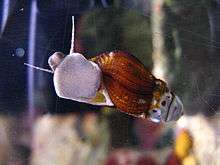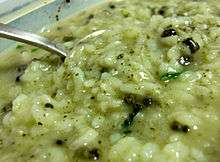Semisulcospira
Semisulcospira is a genus of freshwater snails with an operculum, an aquatic gastropod mollusks in the family Semisulcospiridae.
| Semisulcospira | |
|---|---|
 | |
| Semisulcospira kurodai | |
| Scientific classification | |
| Kingdom: | |
| Phylum: | |
| Class: | |
| (unranked): | |
| Superfamily: | |
| Family: | |
| Genus: | Semisulcospira |
Species in the genus Semisulcospira are viviparous.[2]
Species
Species within the genus Semisulcospira include:
- Semisulcospira decipiens (Westerlund, 1883)[3]
- Semisulcospira diminuta Gredler, 1887[4]
- Semisulcospira forticosta (Martens, 1886)[2][5]
- Semisulcospira gottschei (Martens, 1886)[2]
- Semisulcospira gredleri (Boettger, 1886)[5]
- Semisulcospira habei Davis, 1969[3]
- Semisulcospira habei yamaguchi Davis, 1969[3]
- Semisulcospira hongkongensis Brot, 1874[4]
- Semisulcospira kurodai Kajiyama & Habe, 1961[2][3]
- Semisulcospira libertina (Gould, 1859)[2][3]
- Semisulcospira morii Watanabe, 1984[4]
- Semisulcospira multigranosa (Boettger, 1886)[3]
- Semisulcospira nakasekoae Kuroda, 1929[3]
- Semisulcospira niponica (Smith, 1876)[3]
- Semisulcospira ourense Watanabe & Nishino, 1984[4]
- Semisulcospira pacificans (Heude, 1888)[4]
- Semisulcospira reiniana (Brot, 1876)[3]
- Semisulcospira reticulata Kajiyama & Habe, 1961[3]
- Semisulcospira tegulata (Martens, 1894)[2]
- Semisulcospira trachea (Westerlund, 1883)
"Semisulcospira libertina species complex" consist of four species: Semisulcospira libertina, Semisulcospira reiniana, Semisulcospira kurodai and Semisulcospira trachea.[6]
Uses

A bowl of Korean take-out olgaengi (melanian snail) juk.
Semisulcospira snails are used in some forms of cuisine. In Korean cuisine, they are used to flavor a type of congee called juk, which is called olgaengi juk.
gollark: Just use a `17d4d1e7d032045fbf404c9ac5442e44cb43865b5d1768f2de6fc37c4dbd11f0`.
gollark: Oh wait, you don't even need that, strictly speaking.
gollark: Time to deploy the GTech™ first preimage attack™ on SHA256.
gollark: Thanks LyricLy! My entry is in there now.
gollark: I need an extension of arbitrary length for purposes.
References
- Boettger (1886). Jahrb. dtsch. malak. Ges. 13: 4.
- Strong E. & Köhler F. (2009). "Morphological and molecular analysis of "Melania" jacqueti Dautzenberg & Fischer, 1906: from anonymous orphan to critical basal offshoot of the Semisulcospiridae (Gastropoda: Cerithioidea)". Zoologica Scripta 38(5): 483-502. doi:10.1111/j.1463-6409.2008.00385.x
- Davis G. M. (1969). "A taxonomic study of some species of Semisulcospira in Japan (Mesogastropoda: Pleuroceridae)". Malacologia 7: 211-294.
- The IUCN Red List of Threatened Species. Version 2015-3. <www.iucnredlist.org>. Downloaded on 11 November 2015.
- Prozorova L. A. & Rasshepkina A. V. (2005). "On the reproductive anatomy of Semisulcospira (Cerithioidea: Pleuroceridae: Semisulcospirinae)". The Bulletin of the Russian Far East Malacological Society 9: 123–126. PDF.
- (in Japanese) Matsuoka K. & .野尻湖貝類グループ (1982) (Fossil Mollusc Research Group for Noiiri-ko Excavation). "野尻湖層産カワニナ胎児殼化石について : 現生カワニナとの比較研究 "On the fossil embryonic shell of Semisulcospira libertina (GOULD) (Mesogastropoda: Pleuroceridae) from the latest Pleistocene Nojiri-ko Formation, Nagano Prefecture, Central Japan: A comparative study of recent and fossil Semisulcospira". 地球科學 Chikyu kagaku [Earth science] 36(4), 175-184. CiNii.
- (in Japanese) Nakao H., Kawabata T., Fujita K., Nakai K. & Sawada H. (2006). "Predation on bluegill (Lepomis macrochirus) broods by native snails. Japanese Journal of Ichthyology 53(2): 167–173. PDF.
Further reading
- Oniwa K. & Kimura M. (1986). "Genetic variability and relationships in six snail species of the genus Semisulcospira". The Japanese journal of genetics 61(5): 503-514. CiNii. doi:10.1266/jjg.61.503
This article is issued from Wikipedia. The text is licensed under Creative Commons - Attribution - Sharealike. Additional terms may apply for the media files.